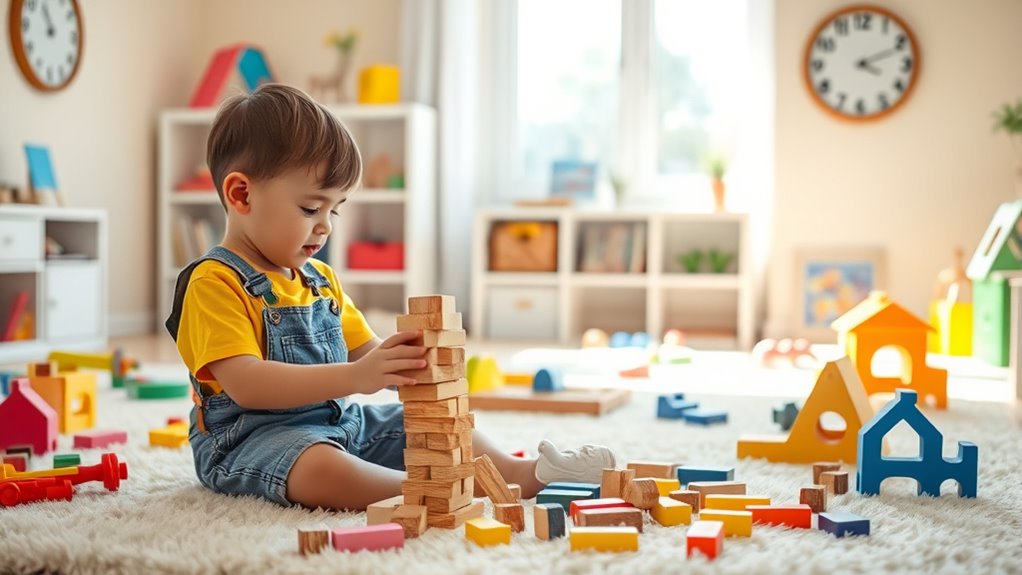Having a consistent routine during your child’s playtime gives them a sense of safety and predictability, helping them feel secure while exploring new activities. It encourages confidence, fosters creativity, and supports smooth progressions between different types of play. This structure also teaches discipline, responsibility, and respect for rules. When routines are in place, play becomes enjoyable and balanced, promoting healthy growth. Keep exploring to discover how all these elements come together for your child’s development.
Key Takeaways
- Establishes a sense of stability and security, making children more comfortable and confident during play.
- Promotes safe and responsible play by familiarizing children with rules and routines.
- Encourages exploration and creativity within a predictable framework, boosting confidence in new activities.
- Facilitates smooth transitions between different types of play, supporting balanced development.
- Reinforces discipline, patience, and respect for schedules, laying groundwork for responsible behavior.

Have you ever wondered how a consistent play routine benefits children? When you establish a regular schedule, you give children a sense of stability that helps them feel secure and confident during playtime. Consistency encourages children to explore their environment more freely because they know what to expect, creating a safe space where they can focus on having fun and learning. This predictability also supports playground safety, as children become familiar with the rules and routines for using equipment, reducing accidents and promoting responsible behavior. When kids know the boundaries and routines, they’re more likely to play safely and respect others, making the playground a more enjoyable space for everyone.
A consistent play routine creates a safe, confident environment where children explore and enjoy learning responsibly.
A routine in children’s playtime isn’t just about safety; it also plays a fundamental role in fostering creative expression. When children follow a consistent schedule, they’re more likely to feel comfortable trying new activities because they trust that playtime will be structured and supportive. This stability allows their imagination to flourish, as they feel free to experiment with different roles, stories, and ideas without feeling overwhelmed. For example, if a routine includes designated times for free play or art activities, children can use this time to explore their interests and develop their unique creative voices. Over time, this regular structure helps them build confidence in their abilities to express themselves, whether through drawing, storytelling, or role-playing.
Furthermore, routines help children transition smoothly between different types of play, such as active outdoor activities and quieter, creative pursuits. When transitions are predictable, children aren’t left confused or frustrated, which keeps the play environment positive and engaging. You can incorporate routines that balance physical activity with moments for creative expression, giving children a well-rounded play experience. For instance, after a vigorous game on the playground, they might shift to a quiet corner for drawing or building with blocks. This balance ensures they develop both their physical skills and their ability to think creatively. Additionally, understanding the importance of play routines can help caregivers and educators create environments that nurture both safety and innovation, fostering a love for learning through play.
In addition, routines teach children discipline and patience, which are essential skills for their overall development. By following a consistent pattern, children learn to manage their expectations and understand the importance of respecting schedules. This understanding helps them develop self-control and a sense of responsibility, both of which are indispensable for their growth. When children see that routines enhance their playtime—making it safer, more enjoyable, and more creative—they’re more likely to embrace these patterns and carry them into other areas of life. Ultimately, a structured play routine lays the foundation for healthy, joyful, and imaginative development.
Frequently Asked Questions
How Does Routine Affect Children’s Social Skills Development?
Routine helps children develop their social skills by providing predictable opportunities for peer interaction. When activities are consistent, kids feel more confident, making it easier to engage and communicate effectively. This structure also supports emotional regulation, as children learn to manage feelings during social exchanges. As a result, routines foster stronger relationships and better social understanding, setting a foundation for healthy peer interactions and emotional growth.
What Are Signs of Routine-Related Stress in Children?
Like a ship lost at sea, children may show signs of routine-related stress, such as bedtime resistance or separation anxiety. You might notice they cling more or resist going to bed, struggling with shifts. These behaviors indicate they’re feeling unsettled by changes in their routine. Pay close attention to these clues, and gently reassure your child, helping them regain a sense of stability and security in their daily schedule.
Can Too Much Routine Hinder Creativity in Play?
You might wonder if too much routine can hinder creativity in play. It’s true that excessive structure can limit children’s creative freedom, making play feel predictable and less spontaneous. When children lack opportunities for spontaneous play, their imagination might not flourish as much. To foster creativity, balance routine with flexible periods that encourage kids to explore freely, invent new games, and express themselves without constraints.
How Flexible Should Routines Be During Holidays or Special Events?
During holidays or special events, you should incorporate some holiday flexibility and special event adaptation into routines. While maintaining a basic structure helps children feel secure, being flexible allows them to enjoy celebrations without stress. Adjust routines to include festive activities or extended playtime, but keep essential parts consistent. This balance helps children experience joy and familiarity, making special occasions memorable without disrupting their sense of security.
What Role Does Routine Play in Children With Developmental Challenges?
Your child’s world can feel like a whirlwind, but routine provides stability, especially for children with developmental challenges. You play a vital role by creating customized schedules and incorporating sensory routines that cater to their unique needs. These structured activities help them feel secure, reduce anxiety, and improve their ability to adapt. Consistent routines become their anchor, guiding them through daily challenges with confidence and ease.
Conclusion
By establishing a routine, you help children develop consistency, build confidence, and foster independence. With a set schedule, they know what to expect, what to enjoy, and what to look forward to. Routine creates stability, promotes growth, and encourages exploration. When you prioritize a structured playtime, you nurture their creativity, support their development, and strengthen your bond. In the end, routine isn’t just about order; it’s about empowering children to thrive, learn, and love their playtime.










